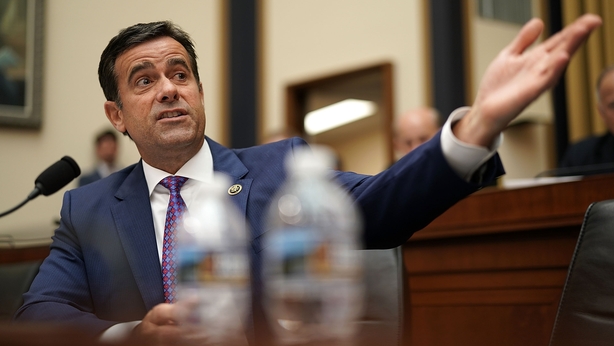US intelligence chief Dan Coats will leave office next month, US President Donald Trump has announced, after a tenure in which he was regularly at odds with the president.
The departure of Mr Coats, who has, however, sought to avoid direct confrontation with Mr Trump during his time as Director of National Intelligence, is the latest high-profile exit from the president's administration.
Mr Trump tweeted that Mr Coats will leave on 15 August, saying he plans to nominate Representative John Ratcliffe of Texas, who serves on the House intelligence, judiciary and homeland security committees, to replace him.
"A former US Attorney, John will lead and inspire greatness for the Country he loves," Mr Trump wrote, also thanking Mr Coats "for his great service to our Country".
If Mr Ratcliffe's nomination is approved, Mr Trump will get an intelligence chief who is more in synch with his views.
In Congress, he has been a staunch defender of Mr Trump and has criticised two of the president's nemeses, former FBI chief James Comey and special counsel Robert Mueller.

Mr Ratcliffe has also said he has "seen no evidence" that Russian election meddling helped bring Mr Trump to office, has backed the president's assertion that court-approved surveillance of his campaign amounted to spying, and has supported his hawkish policy on Iran.
The choice of Mr Ratcliffe was hailed by various Republicans -- including House Minority Leader Kevin McCarthy, who tweeted that he "will bring strength and accountability in his new role" -- but drew criticism from other quarters.
"Our Director of National Intelligence should be above partisan politics, speak truth to power, and resist Trump's abuses of authority. John Ratcliffe doesn't fit that bill," Democratic presidential hopeful Elizabeth Warren tweeted.
I am pleased to announce that highly respected Congressman John Ratcliffe of Texas will be nominated by me to be the Director of National Intelligence. A former U.S. Attorney, John will lead and inspire greatness for the Country he loves. Dan Coats, the current Director, will....
— Donald J. Trump (@realDonaldTrump) July 28, 2019
Mr Coats has not seen eye-to-eye with Mr Trump on a range of issues while serving as the official who oversees and coordinates the CIA, NSA and other US espionage bodies.
He backed the US intelligence community's conclusion that Russia interfered in the 2016 election that brought Mr Trump to office, something the president was long loath to acknowledge.
The intelligence chief also disagreed with Mr Trump's decision to hold two hours of closed-door talks with Russian President Vladmir Putin in Helsinki in July 2018 with no one else present but interpreters.
"If he had asked me how that ought to be conducted, I would have suggested a different way," Mr Coats said.
He acknowledged he was not informed about the contents of the talks, saying three days after they were held: "I don't know what happened in that meeting."
We need your consent to load this rte-player contentWe use rte-player to manage extra content that can set cookies on your device and collect data about your activity. Please review their details and accept them to load the content.Manage Preferences
Mr Trump's attempts to get North Korea to give up its nuclear arsenal via talks with Pyongyang's leader Kim Jong Un was another point of disagreement.
"We continue to assess that North Korea is unlikely to give up all of its nuclear weapons and production capabilities, even as it seeks to negotiate partial denuclearisation steps to obtain key US and international concessions," Mr Coats said in the annual "Worldwide Threat Assessment" report earlier this year.
North Korea's leaders see having a nuclear weapons capability as "critical to regime survival," Mr Coats said.
Mr Trump, however, has taken the view that Mr Kim is willing to give up his nuclear arms.
The report also warned that the Islamic State group, despite Mr Trump's assertions to the contrary, was hardly vanquished and could easily rise again in a vacuum left by departing US forces, resuming global attacks and restarting its propaganda machine.
IS "still commands thousands of fighters in Iraq and Syria, and it maintains eight branches, more than a dozen networks, and thousands of dispersed supporters around the world, despite significant leadership and territorial losses," Mr Coats said.
Mr Coats's departure will be the latest in a long series of exits by top Trump administration officials, including defense secretary Jim Mattis, homeland security chief Kirstjen Nielsen, chief of staff John Kelly and secretary of state Rex Tillerson.

